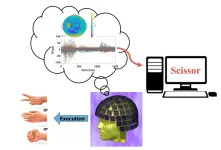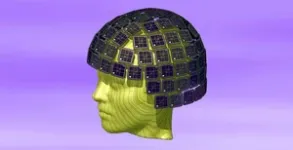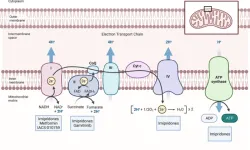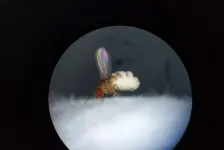(Press-News.org) LA JOLLA, CA, May 19, 2023 — Researchers from University of California San Diego have found a way to distinguish among hand gestures that people are making by examining only data from noninvasive brain imaging, without information from the hands themselves. The results are an early step in developing a non-invasive brain-computer interface that may one day allow patients with paralysis, amputated limbs or other physical challenges to use their mind to control a device that assists with everyday tasks.
The research, recently published online ahead of print in the journal Cerebral Cortex, represents the best results thus far in distinguishing single-hand gestures using a completely noninvasive technique, in this case, magnetoencephalography (MEG).
“Our goal was to bypass invasive components,” said the paper’s senior author Mingxiong Huang, PhD, co-director of the MEG Center at the Qualcomm Institute at UC San Diego. Huang is also affiliated with the Department of Electrical and Computer Engineering at the UC San Diego Jacobs School of Engineering and the Department of Radiology at UC San Diego School of Medicine, as well as the Veterans Affairs (VA) San Diego Healthcare System. “MEG provides a safe and accurate option for developing a brain-computer interface that could ultimately help patients.”
The researchers underscored the advantages of MEG, which uses a helmet with embedded 306-sensor array to detect the magnetic fields produced by neuronal electric currents moving between neurons in the brain. Alternate brain-computer interface techniques include electrocorticography (ECoG), which requires surgical implantation of electrodes on the brain surface, and scalp electroencephalography (EEG), which locates brain activity less precisely.
“With MEG, I can see the brain thinking without taking off the skull and putting electrodes on the brain itself,” said study co-author Roland Lee, MD, director of the MEG Center at the UC San Diego Qualcomm Institute, emeritus professor of radiology at UC San Diego School of Medicine, and physician with VA San Diego Healthcare System. “I just have to put the MEG helmet on their head. There are no electrodes that could break while implanted inside the head; no expensive, delicate brain surgery; no possible brain infections.”
Lee likens the safety of MEG to taking a patient’s temperature. “MEG measures the magnetic energy your brain is putting out, like a thermometer measures the heat your body puts out. That makes it completely noninvasive and safe.”
Rock Paper Scissors
The current study evaluated the ability to use MEG to distinguish between hand gestures made by 12 volunteer subjects. The volunteers were equipped with the MEG helmet and randomly instructed to make one of the gestures used in the game Rock Paper Scissors (as in previous studies of this kind). MEG functional information was superimposed on MRI images, which provided structural information on the brain.
To interpret the data generated, Yifeng (“Troy”) Bu, an electrical and computer engineering PhD student in the UC San Diego Jacobs School of Engineering and first author of the paper, wrote a high-performing deep learning model called MEG-RPSnet.
“The special feature of this network is that it combines spatial and temporal features simultaneously,” said Bu. “That’s the main reason it works better than previous models.”
When the results of the study were in, the researchers found that their techniques could be used to distinguish among hand gestures with more than 85% accuracy. These results were comparable to those of previous studies with a much smaller sample size using the invasive ECoG brain-computer interface.
The team also found that MEG measurements from only half of the brain regions sampled could generate results with only a small (2 – 3%) loss of accuracy, indicating that future MEG helmets might require fewer sensors.
Looking ahead, Bu noted, “This work builds a foundation for future MEG-based brain-computer interface development.”
In addition to Huang, Lee and Bu, the article, “Magnetoencephalogram-based brain–computer interface for hand-gesture decoding using deep learning” (https://doi.org/10.1093/cercor/bhad173), was authored by Deborah L. Harrington, Qian Shen and Annemarie Angeles-Quinto of VA San Diego Healthcare System and UC San Diego School of Medicine; Hayden Hansen of VA San Diego Healthcare System; Zhengwei Ji, Jaqueline Hernandez-Lucas, Jared Baumgartner, Tao Song and Sharon Nichols of UC San Diego School of Medicine; Dewleen Baker of VA Center of Excellence for Stress and Mental Health and UC San Diego School of Medicine; Imanuel Lerman of UC San Diego, its School of Medicine and VA Center of Excellence for Stress and Mental Health; and Ramesh Rao (director of Qualcomm Institute), Tuo Lin and Xin Ming Tu of UC San Diego.
The work was supported in part by Merit Review Grants from the US Department of Veterans Affairs, Naval Medical Research Center's Advanced Medical Development program and Congressionally Directed Medical Research Programs/Department of Defense.
END
New study shows noninvasive brain imaging can distinguish among hand gestures
The research from the Qualcomm Institute at UC San Diego points to a safe, accurate brain-computer interface that might help patients with paralysis and other challenges
2023-05-19
ELSE PRESS RELEASES FROM THIS DATE:
Ticogrelor monotherapy post PCI associated with similar rates of revascularization as duel antiplatelet therapy
2023-05-19
Phoenix, AZ (May 19, 2023)- New insights from the TWILIGHT trial showed that ticagrelor monotherapy after three months of ticagrelor plus aspirin was associated with similar rates of recurrent coronary revascularization, major adverse cardiac and cerebrovascular events (MACCE) and a lower risk of net adverse clinical events (NACE) compared with duel antiplatelet therapy (DAPT). The results from the randomized control trial of more than 7,000 patients were presented today as late-breaking clinical research at ...
An innovative machine-learning program reveals genes responsible for sex-specific differences in Alzheimer's disease progression
2023-05-19
Alzheimer's Disease (AD) is a complex neurodegenerative illness with genetic and environmental origins. Females experience faster cognitive decline and cerebral atrophy than males, while males have greater mortality rates. Using a new machine-learning method they developed called ‘Evolutionary Action Machine Learning (EAML)’, researchers at Baylor College of Medicine and the Jan and Dan Duncan Neurological Research Institute (Duncan NRI) at Texas Children’s Hospital have discovered sex-specific genes and molecular pathways that contribute to the development and progression of this condition. The study was published in Nature Communications.
“We ...
Targeting cellular respiration as a therapeutic strategy in glioblastoma
2023-05-19
BUFFALO, NY- May 19, 2023 – A new research perspective was published in Oncotarget's Volume 14 on May 4, 2023, entitled, “Targeting cellular respiration as a therapeutic strategy in glioblastoma.”
While glycolysis is abundant in malignancies, mitochondrial metabolism is significant as well. Mitochondria harbor the enzymes relevant for cellular respiration, which is a critical pathway for both regeneration of reduction equivalents and energy production in the form of ATP.
In this research perspective, researchers Enyuan Shang, Trang Thi Thu Nguyen, Mike-Andrew Westhoff, Georg Karpel-Massler, and Markus ...
Why do so many businesses fail? A new study suggests it has to do with when they're born
2023-05-19
Only 25% of new businesses make it to 15 years or more, according to data from the U.S. Bureau of Labor and Statistics. Despite vacillating economic conditions between and across markets, that statistic has remained consistent for 30 years. A new study from the Strategic Entrepreneurship Journal suggests an elegant explanation: a business’s long-term success depends significantly on its founding conditions not just changes in its markets.
“A venture’s performance following environmental change depends on its internal ...
Blinding idea evaluation? New experiment reveals little bias in the innovation process
2023-05-19
Innovation and implementation of new ideas can directly influence organizational outcomes. Thus, organizations often dedicate significant time to the assessment of countless new ideas through myriad idea evaluation systems. However, the evaluation process is often distorted by various biases arising from hierarchy, sequence, and nepotism. Data on evaluation studies show that evaluators can be biased toward specific idea proposers.
In a new study published in the Strategic Management Journal, a research team sought evidence for the bias claim by employing a blinding approach for evaluating ...
Novel approach that stimulates cells’ DNA repair mechanisms may combat a leading cause of autism spectrum disorders
2023-05-19
Key Takeaways
Researchers have discovered that stimulating cells’ DNA repair mechanisms may correct the inherited genetic defect that defines fragile X syndrome, a leading cause of autism spectrum disorders.
The method involves enhanced production of special nucleic acid structures called “R-loops” that cells see as DNA damage.
BOSTON – New research has identified a potential method for treating fragile X syndrome, a leading cause of autism spectrum disorders that is characterized ...
UAF scientists to hunt for clues about Arctic Ocean glaciation
2023-05-19
Evidence indicates a thick ice sheet, not annual sea ice and icebergs, covered the Arctic Ocean at some point during the last 140,000 years. Now, University of Alaska Fairbanks scientists will be looking for more geologic proof of the ice sheet’s existence, sources, behavior and extent.
UAF Geophysical Institute scientists will focus on the Beaufort and Chukchi seas region, both offshore and onshore.
They hope to discover the extent of glaciation and improve understanding of the timing of glacial advances and retreats. Those cycles are thought to have occurred approximately 140,000 to 70,000 years ago, a period known as the ...
Pollinators are attracted to humidity, not just scent
2023-05-19
ITHACA, N.Y. -- Humidity is as important as scent in attracting pollinators to a plant, new Cornell-led research finds, advancing basic biology and opening new avenues to support agriculture.
In a study published May 7 in Current Biology, a team of Cornell researchers and colleagues at Harvard University and the Montgomery Botanical Center found that the weevil responsible for pollinating the plant Zamia furfuracea was just as sensitive to humidity as to scent.
“The world of plant-insect interactions was drastically changed by the work that was done on visual and scent cues,” ...
Puppeteer fungus’ targeted takeover of zombie flies
2023-05-19
In a new study published in eLife, lead author Carolyn Elya, postdoctoral researcher in the Department of Organismic and Evolutionary Biology at Harvard, reveals the molecular and cellular underpinnings behind the parasitic fungus, Entomophthora muscae’s (E. muscae), ability to manipulate the behavior of fruit flies.
Elya first described the manipulated behavior, called summiting, in a study published in eLife in 2018. Elya, who was studying microbes carried by fruit flies while a graduate student ...
NACMI: International COVID-19 Registry uncovers increased incidence of clotting in heart attack patients with COVID-19
2023-05-19
PHOENIX, AZ (May 19, 2023) – The latest analysis from The North American COVID-19 STEMI (NACMI) was presented today as late-breaking clinical research at the Society for Cardiovascular Angiography & Interventions (SCAI) 2023 Scientific Sessions. The findings show patients with an ST-elevated myocardial infarction, or STEMI, and COVID-19 had a significant amount of clotting in their arteries both before and after intervention. Importantly, clots were seen in multiple arteries in close to 30% of patients, a phenomenon observed in less than 5% of patients with heart attacks who do not ...
LAST 30 PRESS RELEASES:
National poll finds gaps in community preparedness for teen cardiac emergencies
One strategy to block both drug-resistant bacteria and influenza: new broad-spectrum infection prevention approach validated
Survey: 3 in 4 skip physical therapy homework, stunting progress
College students who spend hours on social media are more likely to be lonely – national US study
Evidence behind intermittent fasting for weight loss fails to match hype
How AI tools like DeepSeek are transforming emotional and mental health care of Chinese youth
Study finds link between sugary drinks and anxiety in young people
Scientists show how to predict world’s deadly scorpion hotspots
ASU researchers to lead AAAS panel on water insecurity in the United States
ASU professor Anne Stone to present at AAAS Conference in Phoenix on ancient origins of modern disease
Proposals for exploring viruses and skin as the next experimental quantum frontiers share US$30,000 science award
ASU researchers showcase scalable tech solutions for older adults living alone with cognitive decline at AAAS 2026
Scientists identify smooth regional trends in fruit fly survival strategies
Antipathy toward snakes? Your parents likely talked you into that at an early age
Sylvester Cancer Tip Sheet for Feb. 2026
Online exposure to medical misinformation concentrated among older adults
Telehealth improves access to genetic services for adult survivors of childhood cancers
Outdated mortality benchmarks risk missing early signs of famine and delay recognizing mass starvation
Newly discovered bacterium converts carbon dioxide into chemicals using electricity
Flipping and reversing mini-proteins could improve disease treatment
Scientists reveal major hidden source of atmospheric nitrogen pollution in fragile lake basin
Biochar emerges as a powerful tool for soil carbon neutrality and climate mitigation
Tiny cell messengers show big promise for safer protein and gene delivery
AMS releases statement regarding the decision to rescind EPA’s 2009 Endangerment Finding
Parents’ alcohol and drug use influences their children’s consumption, research shows
Modular assembly of chiral nitrogen-bridged rings achieved by palladium-catalyzed diastereoselective and enantioselective cascade cyclization reactions
Promoting civic engagement
AMS Science Preview: Hurricane slowdown, school snow days
Deforestation in the Amazon raises the surface temperature by 3 °C during the dry season
Model more accurately maps the impact of frost on corn crops
[Press-News.org] New study shows noninvasive brain imaging can distinguish among hand gesturesThe research from the Qualcomm Institute at UC San Diego points to a safe, accurate brain-computer interface that might help patients with paralysis and other challenges



